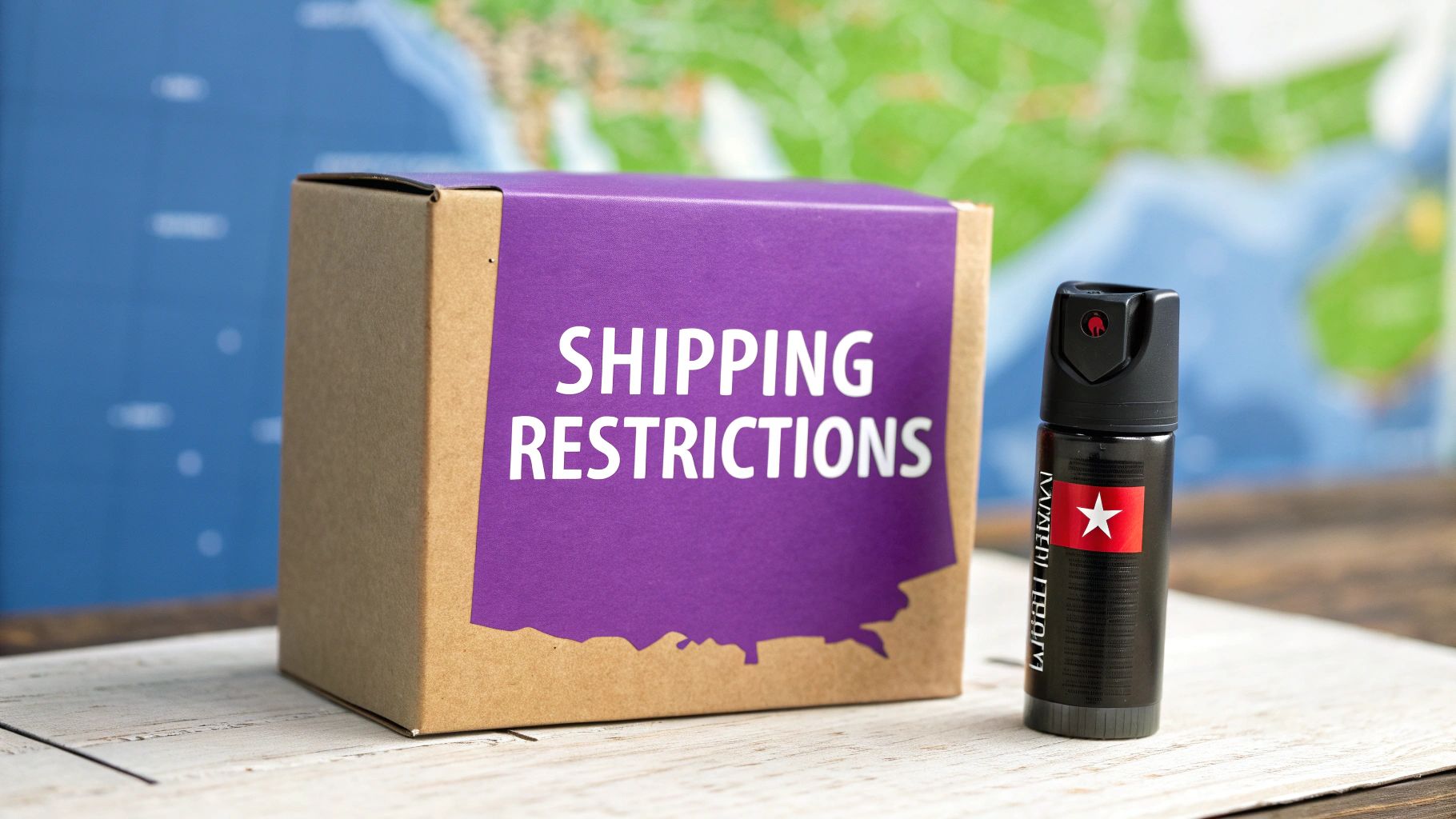
Pepper Spray & Self-Defense Shipping Restrictions by State
Learn all about Pepper Spray and Self-Defense Product Shipping Restrictions by State to ensure legal and safe delivery. Find out more now!
Cody Y.
Updated on Sep 25, 2025
Selling self-defense products online seems straightforward, but it comes with a massive catch: a confusing and frustrating web of pepper spray and self-defense product shipping restrictions by state. While pepper spray is legal for personal use in all 50 states, shipping it directly to customers is often illegal. For e-commerce businesses, ignoring these rules is a recipe for disaster.
The State-by-State Shipping Maze
Jumping into self-defense e-commerce means you’re immediately faced with a patchwork of state-specific shipping laws. It's a common mistake to think that if someone can legally own a product in a certain state, you can legally ship it to them. That’s a dangerous assumption.
When it comes to pepper spray, stun guns, and similar items, the reality is a fragmented landscape where the rules change the moment you cross a state line.
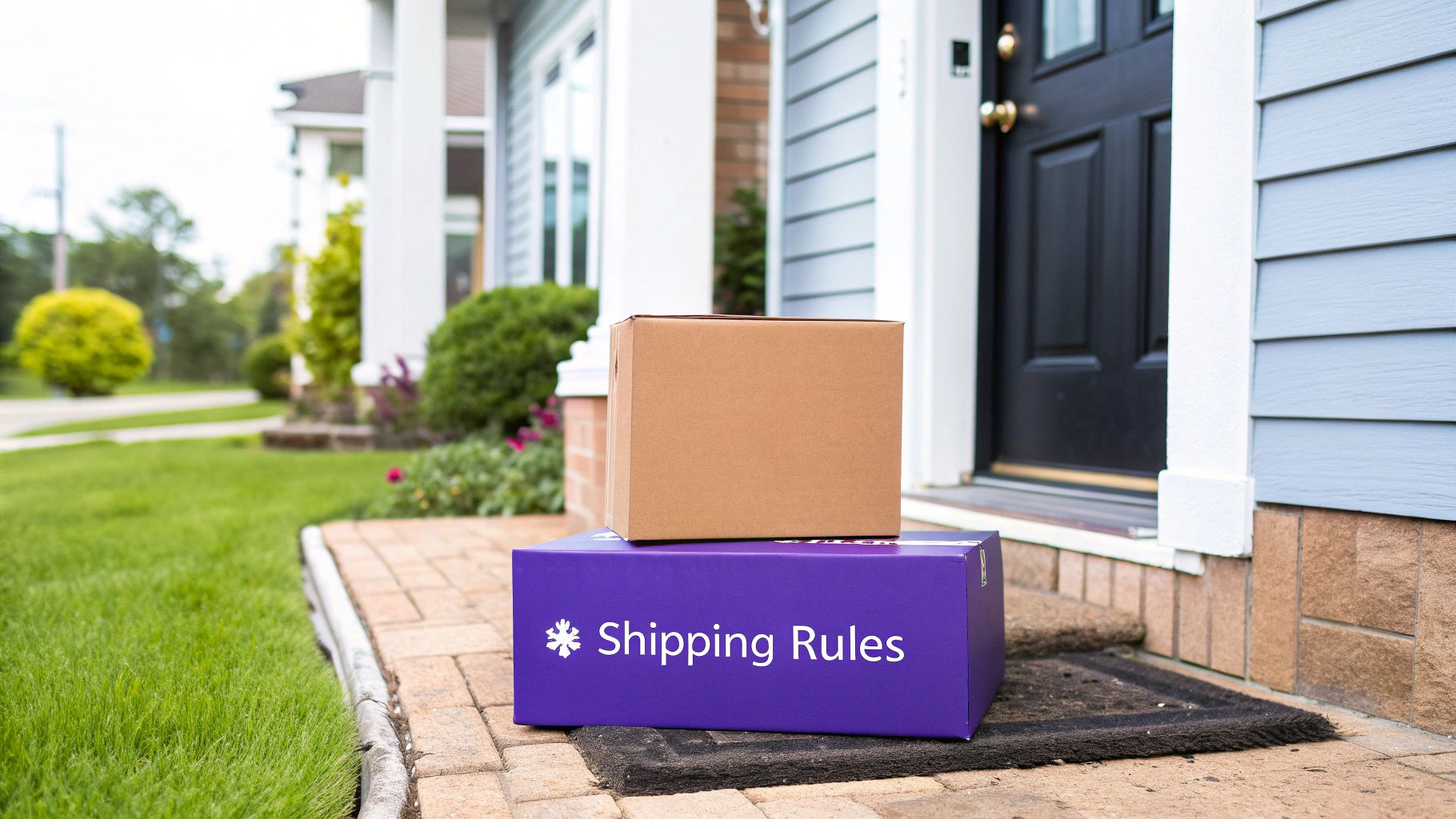
This patchwork of regulations isn't random. Many states created these laws to control how self-defense items are distributed and to prevent them from getting into the wrong hands. Some states require an in-person purchase to verify the buyer's age or to make sure they aren't legally barred from owning such a device. Think of it like buying certain medications—some you can grab off the shelf, but others require you to speak with a pharmacist first.
Why You Absolutely Have to Get This Right
For an online store, pleading ignorance of these laws won't get you very far. An order that looks perfectly fine on your screen could be a direct violation of state or local laws. That simple act of shipping a product from your warehouse to a customer’s door could lead to some serious headaches:
- Hefty Fines: States don't mess around. Violating shipping laws can result in significant financial penalties.
- Seized Shipments: Your packages can be confiscated by carriers or law enforcement, which means lost product, lost revenue, and an unhappy customer.
- Legal Trouble: In a worst-case scenario, your business could face legal action for illegally distributing restricted products.
- Damaged Reputation: Nothing sours a customer experience faster than a canceled or seized order. The resulting negative reviews can do lasting damage to your brand.
This guide is here to help you make sense of these tangled regulations. We’ll break down which states block direct-to-consumer shipments, which ones have specific product limitations, and how you can protect your business from these expensive mistakes.
The biggest takeaway for any e-commerce seller is this: legality for possession does not equal legality for shipping. States like New York and Massachusetts, for example, require that self-defense products be sold in person by licensed vendors. This makes online sales to customers in those states completely illegal.
Getting a handle on this landscape is the first step toward building a responsible and successful business. Later on, we’ll dive into how modern tools can automate your compliance, taking the guesswork out of enforcing these rules so you can focus on serving your customers—safely and legally.
The Reasons Behind Strict Pepper Spray Shipping Rules
So, why is shipping a small can of pepper spray such a headache for online sellers? It’s not just about a simple list of rules. The answer digs into critical safety classifications on the federal side and very specific public safety concerns at the state level. If you want to sell self-defense products online, getting a handle on the "why" is the first step to navigating this tricky landscape without running into trouble.
At the highest level, the shipping complications start with how carriers like USPS, FedEx, and UPS see pepper spray. It's not treated like a can of hairspray or a bottle of lotion. Because of its powerful active ingredient, it gets slapped with a hazardous materials label.
The Hazardous Material Classification
The punch in pepper spray comes from oleoresin capsicum (OC), a potent inflammatory agent pulled from cayenne peppers. Think of it as the stuff that makes hot peppers spicy, but cranked up to an intensely concentrated level. Because OC can cause severe burning, inflammation, and respiratory distress, carriers have to follow strict protocols for handling it.
This brings us to its official designation. Pepper spray is classified as a Hazard Class 6 toxic material due to its active biochemical ingredients. This classification alone throws a wrench into the works, complicating mailing under USPS and other carrier regulations. You can see a great breakdown of how this plays out in the real world on Blingsting's state restriction guide.
This "hazmat" status triggers a whole series of safety measures designed to protect everyone in the shipping chain, from the person packing the box to the driver delivering it. The main worries are:
- Accidental Discharge: A crushed or poorly packed canister could go off in a truck or warehouse, taking out workers and contaminating every other package around it.
- Pressurized Canisters: Just like any aerosol can, pepper spray is under pressure. It’s a risk if it gets punctured or exposed to extreme heat.
- Worker Safety: Getting a face full of OC is no joke. It can cause serious temporary harm, so special handling is a must.
Because of these risks, carriers enforce their own tough packaging and labeling rules, and they often restrict which services you can use—think ground shipping only, no air transport.
The Legislative Intent Behind State Laws
While the feds' hazmat rules control how pepper spray is shipped, state laws dictate who can buy it and how it's sold. These laws aren’t just thrown together randomly; they’re carefully crafted to strike a balance between a person's right to self-defense and the public's overall safety. The intent behind these state-specific pepper spray and self-defense product shipping restrictions usually boils down to a few key goals.
A common thread you’ll see in states like New York and Massachusetts is the desire to control the supply chain. By banning direct-to-consumer online sales, they force all purchases to happen in person through a licensed firearms dealer. This creates a critical checkpoint to ensure every sale is compliant.
This face-to-face requirement isn't just for show. It serves several purposes:
- Preventing Misuse: States want to keep pepper spray away from people who might use it to commit crimes. This often includes blocking sales to anyone with a felony conviction.
- Protecting Minors: Age restrictions are incredibly common. By forcing an in-person sale, it's a lot harder for a minor to get their hands on a product they aren't legally allowed to have.
- Controlling Potency and Size: Many states put a cap on how big the canister can be (like 2.5 ounces in California) or how concentrated the OC is. These limits are meant to keep the product in the realm of a defensive tool, not an offensive weapon that could cause lasting injury or be used on a crowd.
When you look at it all together, the federal and state rules work in tandem. The hazmat classification creates logistical hurdles for shipping, and the state laws create a legal minefield for sellers. It’s this combination that explains why selling a seemingly simple self-defense spray is anything but simple.
States That Prohibit Direct-to-Consumer Shipments
While many states have some rules on the books, a handful have put up a hard stop. These are the states that completely prohibit direct-to-consumer (DTC) shipments, making it illegal for online stores to mail pepper spray straight to a customer's door. If you're in the self-defense e-commerce space, this list is your non-negotiable "no-fly zone."
Trying to ship to these states isn't just a simple mix-up; it's a direct violation of state law that can bring serious heat. These states have decided the only responsible way to handle self-defense spray sales is through an in-person transaction, where a buyer's age and eligibility can be properly verified. Getting these absolute prohibitions straight is the first and most critical step in building a compliant shipping process.
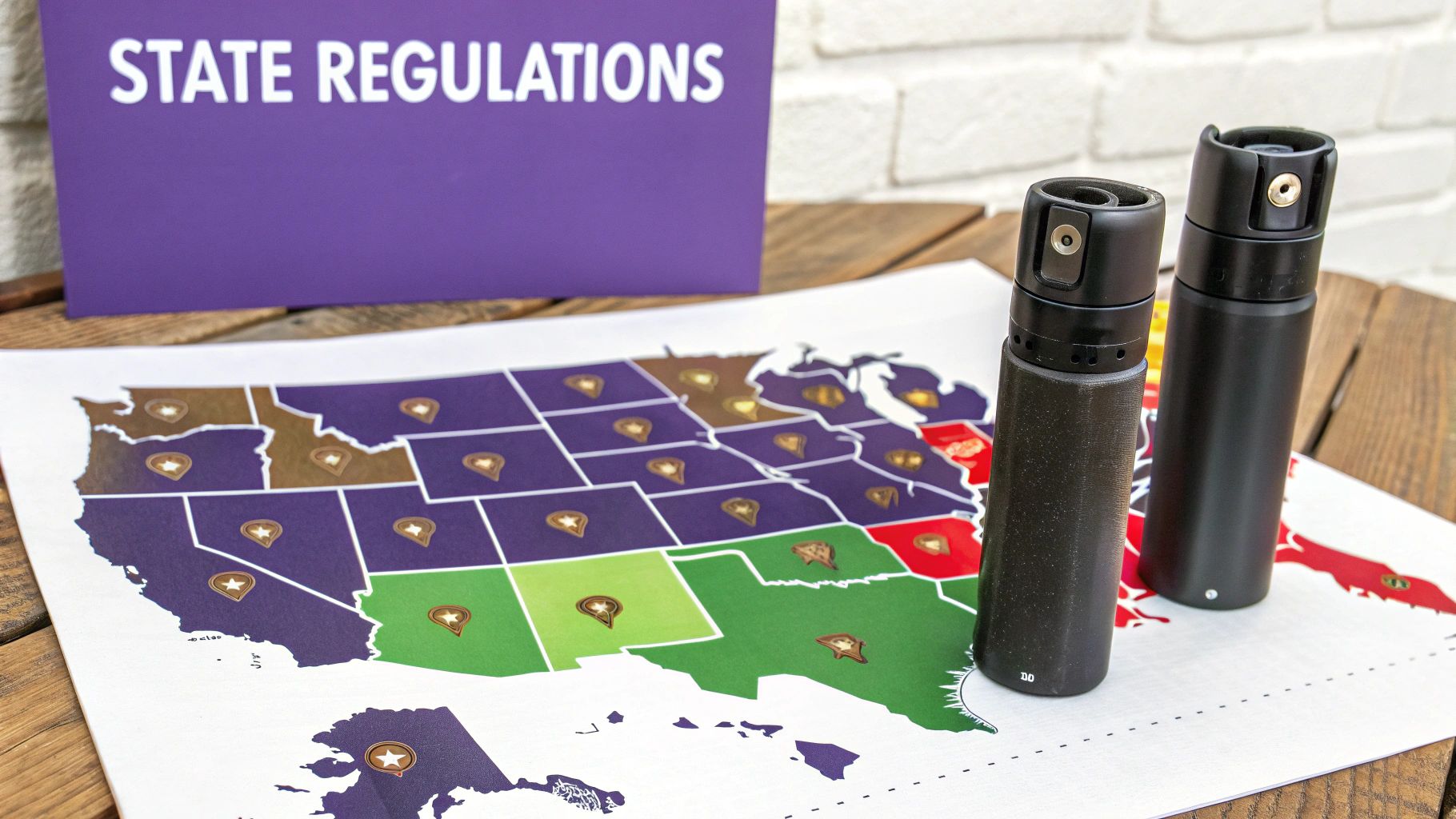
New York: The Gold Standard of Restriction
When it comes to strict regulations, New York is in a league of its own. The state has built a system that effectively shuts down all online sales of pepper spray directly to consumers. It is completely illegal to ship pepper spray to any residential address in New York.
The law is designed to control every single link in the supply chain. Instead of letting online retailers ship from anywhere, New York requires all sales to happen face-to-face through a very specific list of licensed vendors. This makes it tougher for consumers, but it nails the state's goal of keeping a tight grip on who buys these products.
The core rules are pretty clear:
- In-Person Sales Only: All purchases have to be made in person at either a licensed firearms dealer or a licensed pharmacist.
- No Online Shipping: Direct shipments to customers are strictly forbidden. No exceptions.
- Product Specifications: Canisters can't hold more than 0.75 ounces of product, and the OC concentration can't go over 0.7% major capsaicinoids.
- Quantity Limits: A customer can only buy a maximum of two pepper spray devices at one time.
For any online seller, New York is a definitive "do not ship" state. There are no workarounds or gray areas for direct sales.
Massachusetts: A Licensing Labyrinth
Massachusetts uses a similar playbook to New York, prioritizing in-person deals with licensed sellers over the ease of e-commerce. The state demands a special license to both sell and carry pepper spray, which creates a regulatory framework that makes online sales impossible.
Like New York, the law in Massachusetts is set up to ensure every sale is documented and handled by a state-approved vendor. You cannot ship pepper spray directly to a customer in Massachusetts, period.
The legal thinking in states like Massachusetts and New York is straightforward: while self-defense tools are legal, they should be sold through a controlled and verifiable process. By forcing sales through licensed firearms dealers, the state makes sure age and background requirements are met before the product ever changes hands.
The state’s key restrictions are:
- Licensed Firearms Dealers Only: Only licensed firearms dealers are legally allowed to sell pepper spray.
- Firearms Identification Card (FID): To buy pepper spray, a customer must have a valid FID card—the same one needed to purchase certain firearms.
- Age Requirements: People aged 15 to 17 can get an FID card with parental permission, but the standard age is 18.
- Online Sales Prohibited: Direct-to-consumer shipments are illegal.
The FID card requirement adds a major layer of verification that you just can't replicate with a standard online checkout form.
Alaska and Hawaii: The Non-Contiguous Challenge
Shipping to Alaska and Hawaii is already a logistical headache thanks to their distance from the lower 48. When you add pepper spray to the mix, those headaches get worse due to specific state laws that ban online sales.
In Alaska, the law is explicit: the online sale of pepper spray to consumers is prohibited. While it's legal for adults to buy and carry, the transaction has to happen inside the state at a brick-and-mortar store.
Hawaii has even tougher rules. Not only are online sales banned, but the state also slaps a tiny size limit on pepper spray canisters, capping them at just 0.5 ounces. This one-two punch of restrictions makes it one of the hardest states for consumers to legally get pepper spray. For online retailers, both states are clear no-ship zones.
It’s a common myth that because pepper spray is legal to carry in all 50 states, it must be legal to ship everywhere. But the sale is often regulated far more strictly than simple possession. For instance, California limits canister size to 2.5 ounces and requires in-person purchases, which blocks online sales. You can explore a full breakdown of these state-by-state nuances to better understand the legal landscape.
To keep things simple, here’s a quick rundown of the states with the most significant shipping prohibitions.
States With Major Pepper Spray Shipping Prohibitions
This table summarizes the states that either completely ban direct-to-consumer online sales of pepper spray or require shipment to a licensed third party.
| State | Type of Restriction | Key Requirement |
|---|---|---|
| New York | Complete Ban on DTC Shipments | In-person purchase from a licensed firearms dealer or pharmacist. |
| Massachusetts | Complete Ban on DTC Shipments | In-person purchase from a licensed firearms dealer with a valid FID card. |
| Alaska | Ban on Online Sales | In-person purchase required; online sales are explicitly illegal. |
| Hawaii | Ban on Online Sales | In-person purchase required, plus a strict 0.5 oz size limit. |
For e-commerce sellers, this table is your essential guide. Any order with a shipping address in these four states needs to be automatically blocked to stay compliant and out of legal trouble.
Navigating Conditional Shipping Rules and Regulations
Beyond the states with outright bans, you'll find a much larger group that operates in a sort of legal gray area governed by "conditional" restrictions. This means you can ship self-defense products to these states, but only if the items meet a very specific checklist of criteria. Getting this wrong is every bit as risky as shipping to a state where it's completely illegal.
Think of it like trying to mail a specific type of plant. Sending a common houseplant is usually fine, but if you're shipping an exotic species, it might need a special permit, have size limitations, or be banned in certain regions to prevent ecological issues. Conditional shipping for pepper spray works the same way—a product's specific attributes determine if it's legal to send.
These conditions create a huge headache for online merchants. A single product in your inventory might be perfectly legal to ship to a customer in one state but completely illegal to send to someone just across the border.
Common Conditions You Will Encounter
To stay compliant, you have to get into the weeds of each state's laws. While the details vary, most conditional rules boil down to three key factors: canister size, chemical potency, and the buyer’s age. These regulations are designed to keep the products as defensive tools, not offensive weapons.
- Canister Size Limits: Many states put a cap on how much formula a canister can hold. California, for instance, has a strict 2.5-ounce maximum on any pepper spray container.
- OC Concentration Maximums: States also regulate the "heat" of the spray. Wisconsin allows pepper spray shipments, but only if the oleoresin capsicum (OC) concentration is 10% or less.
- Mandatory Age Verification: A common requirement is ensuring the buyer is of legal age, usually 18. This is a massive hurdle for e-commerce, as simple "I am over 18" checkboxes often don't cut it legally.
These nuanced rules mean you can't just create a simple "no-ship" list. Your compliance strategy has to be smart enough to check each product against the specific laws of the customer's home state.
The image below gives you a bird's-eye view of just how varied these legal requirements can be, from permits to specific product exemptions.
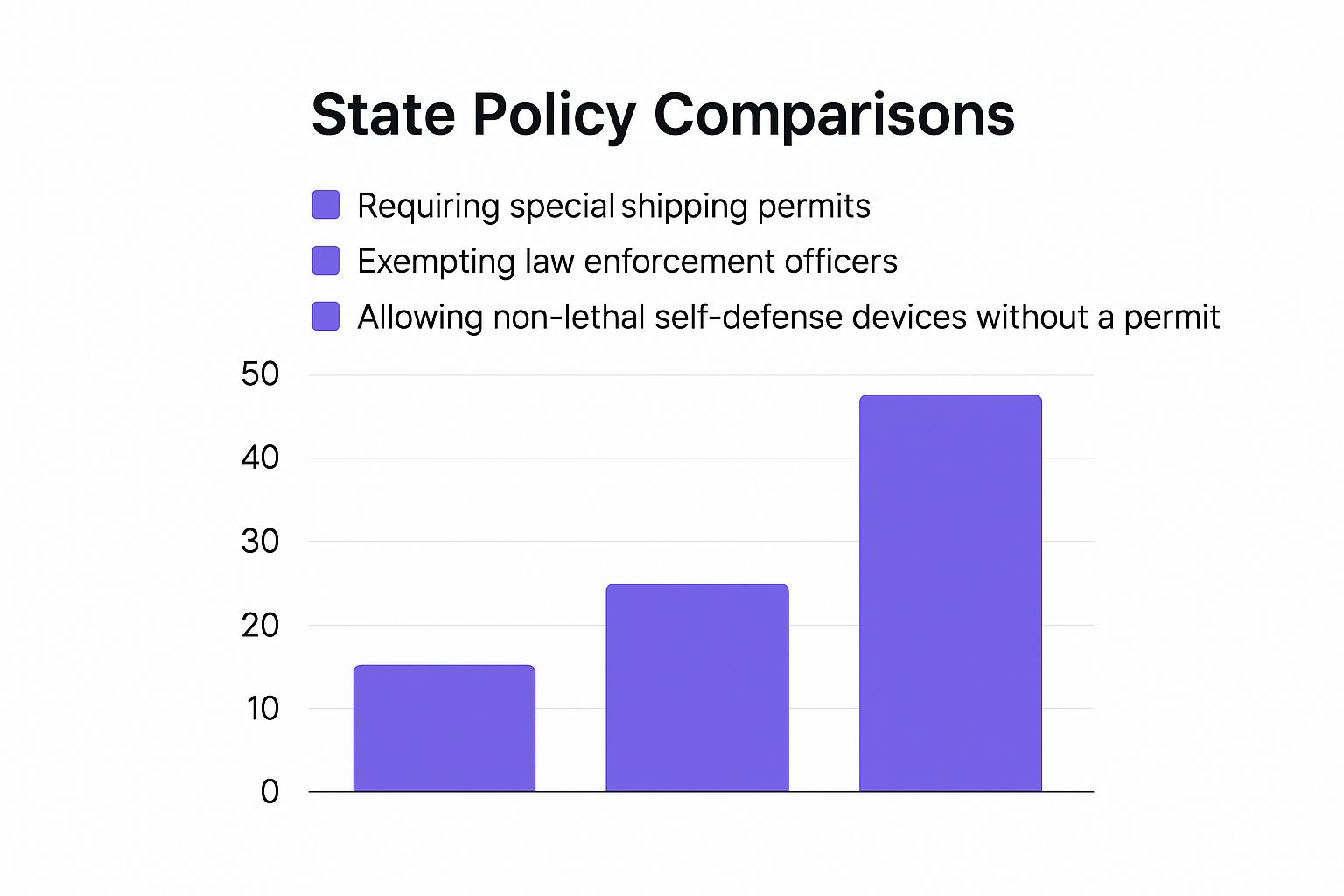
As you can see, while many states permit these devices, a significant number have specific rules that make the shipping process anything but simple.
Comparison of Conditional Pepper Spray Restrictions
The table below offers a comparative look at key states that allow shipping but impose specific limits on product attributes like size and chemical concentration.
| State | Maximum Size (Ounces) | Maximum OC Concentration | Other Notable Rules |
|---|---|---|---|
| California | 2.5 ounces | No specific % cap | Must include a dye marker; cannot be sold to minors |
| Wisconsin | 2.1 ounces | 10% OC maximum | Cannot contain tear gas; must have a safety feature |
| Michigan | 1.2 ounces | 18% OC maximum | Cannot contain more than 35 grams of ortho-chlorobenzalmalononitrile (CS tear gas) |
| New York | 0.75 ounces | 0.7% capsaicinoids | Must be purchased in person from a licensed pharmacist or firearms dealer |
This comparison shows just how granular the rules can get. A product that's perfectly legal in Michigan could easily violate the laws in California, Wisconsin, and New York for entirely different reasons.
Real-World Examples of Conditional Rules
Let's see how these conditional pepper spray and self-defense product shipping restrictions by state play out in the real world. Imagine you sell a standard pepper spray model with a 4-ounce canister and a 15% OC concentration. Now, picture three different customers trying to buy this exact item.
- Customer in Florida: Florida is pretty lenient, but they draw the line at 2 ounces for most personal defense sprays. Your 4-ounce product? Illegal to ship there.
- Customer in Michigan: Michigan’s rules are interesting because they focus on the formula. The law specifies what ingredients are allowed, which means some sprays that mix in tear gas are a no-go.
- Customer in Wisconsin: This state has a hard 10% OC concentration cap. Since your product is at 15%, the sale is illegal. The canister size might be fine, but the formula itself is the problem.
In this scenario, a single product becomes illegal to ship to three different states for three completely different reasons. This level of complexity makes manual order review a nightmare for any business trying to scale.
The bottom line is that conditional restrictions force you to look beyond just the state and dig into the product's specs. A product's legality isn't fixed; it changes based on where the customer lives, making product-level and location-based rules absolutely essential.
Statistically, these variations aren't random. Restrictions on pepper spray often line up with a state's crime rates, population density, and overall approach to weapons regulation. For example, states with huge urban centers like California and New York have tightened rules to curb misuse, restricting container sizes to 2.5 ounces and often requiring in-person sales to address public safety concerns.
Trying to manage these intricate rules by hand is just asking for trouble, which is why automation is so crucial. For merchants on platforms like WooCommerce, setting up a system that can handle these tricky situations is a must. You can check out our guide on setting up conditional shipping based on customer location in WooCommerce to see how it's done. This ensures every order is automatically checked for compliance before it ever hits your fulfillment team, saving you time and preventing some very expensive mistakes.
Automating Your Shipping Compliance Process
Let's be honest: manually tracking the tangled mess of pepper spray and self-defense product shipping restrictions by state is a disaster waiting to happen. All it takes is one employee mistake, an outdated spreadsheet, or a misread regulation to land you with an illegal shipment, hefty fines, and a black eye on your business's reputation. The only real way to handle this complexity is to take human error out of the picture.
This is where automation becomes your best friend. Instead of wasting time on manual order reviews, smart e-commerce stores use automated shipping rules to enforce compliance instantly and accurately, right at checkout.
How Automated Shipping Rules Work
Think of an automated compliance tool as a digital bouncer for your checkout. This software plugs directly into your e-commerce platform, like Shopify or WooCommerce, and works silently in the background, acting as an instant legal check on every single cart.
When a customer types in their shipping address, the system checks that location—down to the state, city, or even ZIP code—against a constantly updated database of shipping laws. It doesn't just look at the address; it also checks the specific products in the cart to make sure every item follows local rules on size, formula, and type.
For instance, if a customer in New York tries to buy pepper spray, the system immediately flags the state's ban on direct-to-consumer shipments. It then automatically blocks the sale before the payment ever goes through, usually showing a custom message explaining why that item can’t ship to their address. This all happens in a split second, giving the customer a smooth experience while keeping your business completely protected.
This is what a well-oiled rules engine looks like in action.
The screenshot shows a clean, organized dashboard where you can build specific rules for different states. It’s your command center, ensuring restricted products never get shipped to places they shouldn't.
The Practical Benefits of Automation
Automating your shipping rules isn't just a nice-to-have; it's a core business need for anyone selling regulated items. The benefits go way beyond just blocking a few bad orders.
- Preventing Illegal Sales: The biggest win is the ironclad protection against breaking state and local laws. Automation makes sure you never accidentally ship a restricted product to a prohibited area.
- Avoiding Costly Fines and Penalties: One compliance slip-up can lead to fines that dwarf the value of the sale. Think of automation as an insurance policy against these expensive mistakes.
- Protecting Your Business Reputation: Canceled orders and seized packages create angry customers and terrible reviews. By stopping the order before it's placed, you dodge that customer service nightmare entirely.
- Eliminating Manual Labor: Just imagine the hours your team would burn manually checking the address and cart contents for every single order. Automation gives you that time back, letting your crew focus on growing the business instead of tedious compliance checks.
Automation changes shipping compliance from a reactive, high-risk chore into a proactive, automatic safeguard. It’s the difference between having a security guard manually checking every ID at the door and having an advanced, foolproof electronic lock that only lets authorized people in.
For businesses on popular platforms, getting these systems up and running is easier than ever. For example, merchants can learn more about how to set up automated shipping compliance for WooCommerce stores to see these principles in action.
At the end of the day, using an automated rules engine like Ship Restrict is the definitive answer to the compliance puzzle. It gives you the peace of mind that comes from knowing your business is protected 24/7, so you can scale your operations with confidence and stay on the right side of the law.
Common Questions About Shipping Self-Defense Products
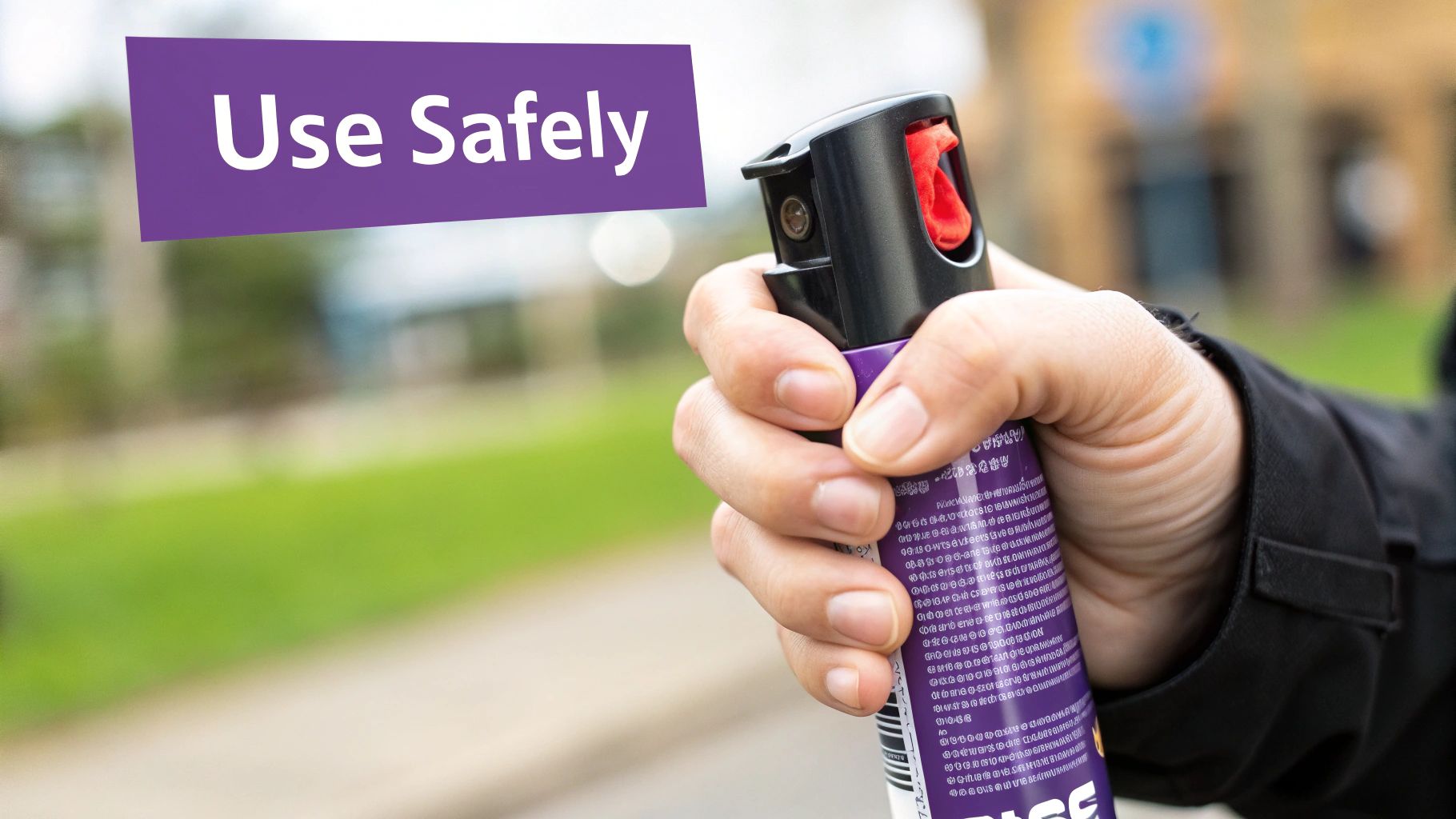
Even after you've got a handle on the state-by-state rules, the real-world questions pop up during daily operations. Let's tackle some of the most common queries we hear from online sellers. These are the quick, direct answers you need to handle those final compliance details with confidence.
Can I Ship Pepper Spray to a P.O. Box?
The short answer is no. Shipping pepper spray to a P.O. Box is a non-starter. Carriers almost universally prohibit it because pepper spray is classified as a hazardous material.
Carriers like USPS demand a physical street address for these kinds of items. It’s not just a technicality—it ensures the delivery location can be cross-referenced with state and local laws, which are tied to a physical jurisdiction, not a mailbox. Insisting on a street address is a simple but critical step to prevent returned shipments and compliance headaches.
What Are the Penalties for Shipping to a Restricted State?
Accidentally sending a package to a restricted state isn't a small mistake; it can set off a chain reaction of costly consequences for your business. These penalties aren't just a slap on the wrist. They can be severe.
The risks of non-compliance are substantial, ranging from immediate financial loss to long-term reputational damage. An automated compliance system isn't just a tool for convenience—it's a necessary shield against significant business threats.
Here’s what you could be up against:
- Package Confiscation: The carrier or authorities can simply seize the shipment. That means lost product and zero revenue.
- Carrier Fines: Companies like FedEx and UPS don't take kindly to violations of their hazardous materials policies and can levy hefty fines.
- Legal Action: A state's attorney general could decide to pursue legal action against your company for illegally shipping restricted products into their jurisdiction.
- Customer Chargebacks: When a customer's order is seized or canceled, you can bet a chargeback is coming, piling on more financial loss and administrative work.
Do These Rules Apply to Other Self-Defense Items?
Yes, absolutely. In fact, many states that put restrictions on pepper spray have similar—or even tougher—laws for other self-defense products like stun guns and TASER devices. The legal landscape for those items is just as fragmented and tricky to navigate.
For example, states like Hawaii, Massachusetts, and New York also ban direct-to-consumer shipments of stun guns. This kind of overlap is common, which means your compliance strategy has to cover every single regulated product you sell, not just pepper spray. It’s the same story with knives, where blade length and knife type are heavily regulated. You can dive deeper into those complexities in our guide to knife shipping laws by state. The bottom line is, you have to apply these shipping rules across your entire catalog of restricted goods.
Trying to manage this web of state-by-state regulations by hand is just asking for trouble. Ship Restrict takes the guesswork and risk out of the equation by automating your entire compliance process. It integrates directly into your store to block illegal sales at checkout, so you never have to worry. Protect your business, save time, and ship with confidence by visiting https://shiprestrict.com.

Cody Yurk
Founder and Lead Developer of ShipRestrict, helping e-commerce businesses navigate complex shipping regulations for regulated products. Ecommerce store owner turned developer.